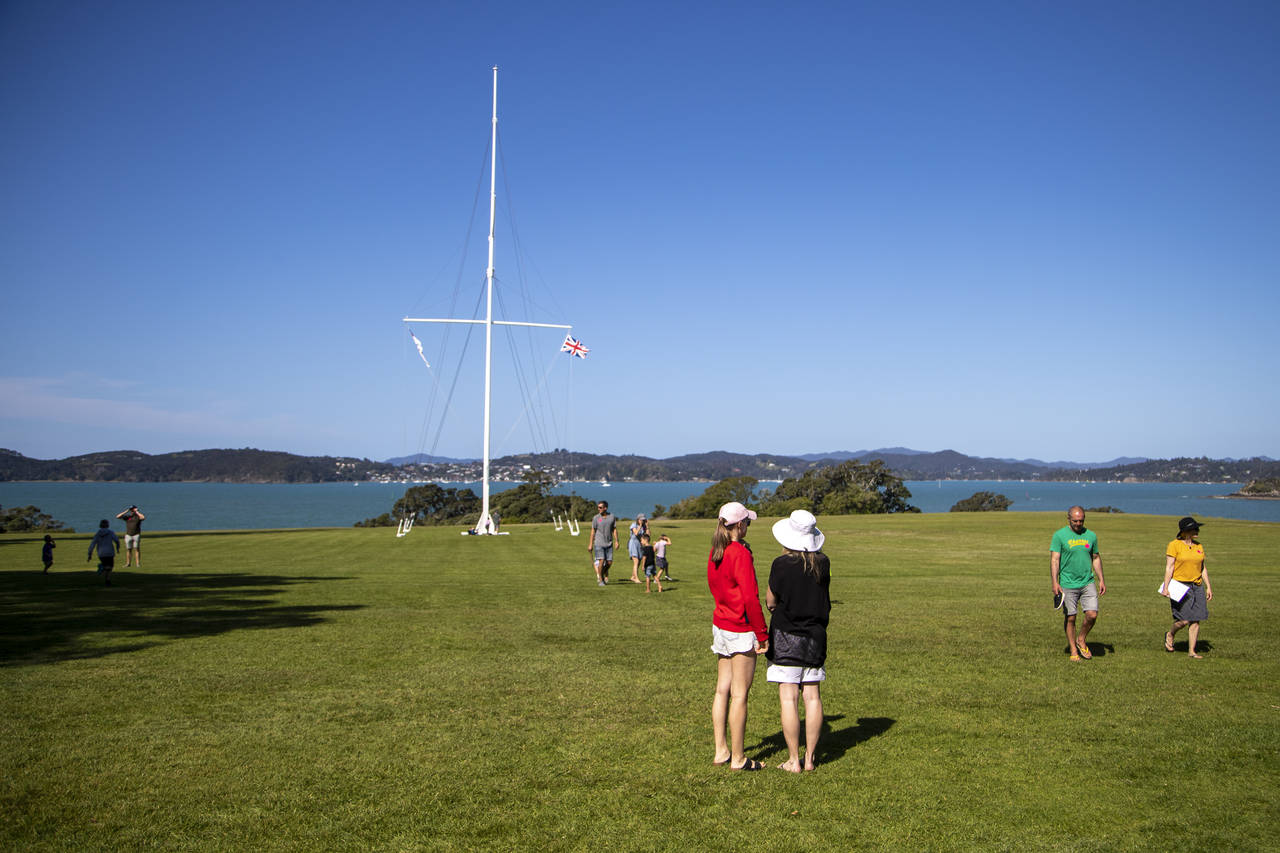New Zealand republic debate complicated by Māori treaty
Sep 15, 2022, 11:13 AM | Updated: 11:58 pm

People walk on the Waitangi Treaty Grounds where the Treaty of Waitangi was first signed between Maori and the British Crown on Feb. 6, 1840, in Waitangi, northern New Zealand on Oct. 5, 2020. The debate in New Zealand over becoming a republic has an unusual twist: Many Indigenous Maori support New Zealand sticking with the monarchy, unlike the Indigenous people in many other former British colonies. That's because Maori signed a treaty with the British Crown in 1840 that guarantees them certain rights, and some Maori fear a constitutional change could threaten those rights. (AP Photo/Mark Baker)
(AP Photo/Mark Baker)
WELLINGTON, New Zealand (AP) — The death of Queen Elizabeth II last week has reignited debate in New Zealand about whether it should continue recognizing Britain’s monarch as its symbolic head of state or take the final step toward independence by becoming a republic.
But there remains a significant complicating factor.
While Indigenous people in many of the 14 nations outside of Britain which recognize the monarchy want to ditch it because they see it as a symbol of colonial repression, views are more mixed among Indigenous New Zealanders. Some Maori leaders favor sticking with the monarchy, at least for now.
That’s because New Zealand’s founding document, the 1840 Treaty of Waitangi, was signed between Maori chiefs and the British crown. The treaty guaranteed Maori sovereignty over their traditional lands and fisheries, and some Maori worry those pledges could be threatened by eliminating the monarchy from New Zealand.
For the past 33 years, New Zealand’s government has been negotiating with Maori tribes and compensating them for historic treaty breaches with settlements of money and land. But the process remains incomplete, with some tribes yet to reach settlements.
Willie Jackson, the government’s minister for Maori development, said the appropriate time for a discussion about becoming a republic would come after the period of mourning for Elizabeth.
“When we do have that conversation, I think the reality for a lot of Maori is the position of the treaty is paramount,” Jackson said. “There has been a lot of worry that the treaty will disappear. So, obviously, some people will be looking for some entrenchment with regards to that.”
Peeni Henare, New Zealand’s defense minister and another influential Maori voice in the government, said that from his perspective, there should be “no thoughts given to becoming a republic” until the treaty settlement process is completed.
Constitutional experts argue that the obligations of New Zealand’s government to compensate Maori under the treaty wouldn’t need to change if it became a republic, and a switch would be a fairly simple legal maneuver to pull off. That hasn’t reassured all Maori.
Some, however, are advocating for New Zealand to become a republic immediately. The small Maori Party, which holds two seats in the Parliament, surprised some observers in February by advocating for a republic as part of broader changes that include setting up a separate Maori parliament.
“The only way this nation can work is when Maori assert their rights to self-management, self-determination, and self-governance over all our domains,” said party co-leader Debbie Ngarewa-Packer at the time, adding: “This won’t mean the crown is off the hook. If a couple gets divorced, you don’t lose responsibility for your child.”
Lewis Holden, the campaign chair of lobby group New Zealand Republic, said the treaty remains key to the republic debate in New Zealand. He said his group’s position is the same as that of academics — that nothing changes about the treaty’s constitutional powers if New Zealand becomes a republic.
When it comes to Indigenous rights, Lewis added, “There is a big question, I think, about that symbolism of staying connected to the monarchy.”
He said that New Zealand likely lags behind Caribbean nations and Australia in the push to become a republic, but he hopes there might be a national referendum on the issue within the next five to 10 years.
“Very clearly there was a lot of support for the monarchy simply because of the good feeling that people had towards the queen,” Holden said.
He said the feeling of nostalgia people had for Elizabeth and her connection to historic events like World War II was now gone — or would be after a spike during the mourning period for Elizabeth — and that support in New Zealand for the monarchy would inevitably wane under the reign of King Charles III.
But over the years, New Zealand’s political leaders have shown little enthusiasm for engaging in the republic debate, no doubt in part because of the thorny Indigenous issues it raises.
Prime Minister Jacinda Ardern said her government doesn’t plan to pursue the issue following the queen’s death.
She said she thought New Zealand will eventually become a republic, and it would probably happen within her lifetime, but that there were more pressing issues for her government to address.
Opposition Leader Christopher Luxon said much the same.
“I don’t see any need for constitutional change right now. I think that it might happen at some point, but that could even be decades away,” he said.
Copyright © The Associated Press. All rights reserved. This material may not be published, broadcast, rewritten or redistributed.














